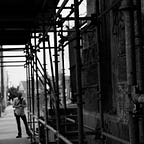Dear Committee of Seventy: Make time for democracy, not status quo
How a venerable Philadelphia institution is failing its mission
Fact: In Philadelphia, there are just as many registered independents and third party candidates as there are Republicans. Republicans can run in primaries. Independents cannot. Democrats dominate city politics, and the voting booth.
And yet, this year’s Republican mayoral candidate will be allowed to participate in a televised debate next week. Those independents and third party folks, not so much.
So how did the Committee of Seventy, first formed in 1904 to “push for better government” and keep Philadelphians “informed about their government” arrive at the decision to exclude independent contenders Jim Foster and Boris Kindij, and Socialist candidate Osborne Hart, from participating in next week’s Leading Questions mayoral debate between Democratic candidate Jim Kenney and Melissa Murray Bailey, a Republican? Here’s the headscratching explanation in full:
We believe that the October 12 debate we are helping to support, held 21 days before the Mayoral election, should focus on the Republican and Democratic candidates nominated by their political parties in the May primary. But we recognize that the real issue here is that Pennsylvania is one of only twelve states that bars independent voters from voting in primary elections. Independent voters have been excluded in the process until very late in the game, by which time the playing field is incredibly tilted in favor of the two major party candidates. Given that’s the system we have now, we need to focus maximum attention on these two candidates, one of whom will likely be elected Mayor November 3. Merely giving five candidates 12 minutes apiece in a 60 minute debate is simply too little, too late and doesn’t serve the interests of either the 105,000 independent voters who only now have the right to cast a meaningful vote, or the 1.5 million citizens of Philadelphia.
Forgive me for rephrasing Committee president David Thornburgh’s verbal gymnastics:
We lament the fact that Philadelphia’s 1.5 million residents are not allowed to vote for third party candidates in city primaries. With that said, the ideas and perspectives of these candidates, however, won’t add value to debates dominated by the machine politics we as an organization are committed to addressing, nor could injecting fresh voices into a televised debate help shake off the pervasive voter apathy we have pledged to address. Oh, and we only have an hour.
Time for a Civics 101 axiom: True democracy begins, in part, with a marketplace of ideas from which people can choose and make informed decisions. With less than a month until the people of Philadelphia choose their next mayor, narrowing the spectrum of approaches to governance runs absolutely contrary to the goal of informing, and educating, the electorate. You might not be in a position to change Pennsylvania’s electoral law right now, Mr. Thornburgh, but it’s certainly within your power to mitigate such archaism.
Do better, Seventy. You must do better. Make time for democracy, not the status quo.
